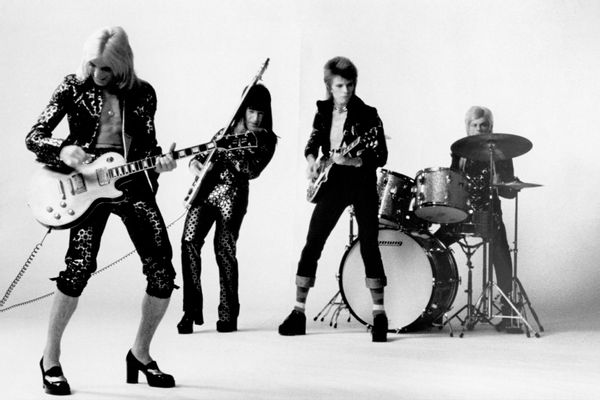
History-making events tend to become more obvious once context develops. This certainly holds true in music. While some movements are obviously earth-shattering in the moment — to name a few, Beatlemania, punk and the ascent of Nirvana — their true impact takes a while to sink in. For example, it was easy to see that Nirvana would become the kind of rock band that defined a generation — but who could've predicted the 2022 resurgence of the band's brooding album cut "Something In the Way" thanks to the movie "The Batman"?
In the summer of 1972, these glam innovators set rock 'n' roll on a cosmic trajectory from which it's still in orbit.
Momentous days also become known largely in hindsight. Take June 16, 1972, which is widely considered to be the release date of two of the most important albums of all time: Roxy Music's self-titled debut and David Bowie's "The Rise & Fall of Ziggy Stardust and the Spiders from Mars." The coincidence is gobsmacking — and, depending on your source, this date might very well be too good to be true — although what's not in question is this: In the summer of 1972, these glam innovators set rock 'n' roll on a cosmic trajectory from which it's still in orbit.
Roxy Music had only been a band for a little over a year when they recorded their debut with Peter Sinfield, King Crimson's lyricist and co-founder. "Re-Make/Re-Model" set the tone for both the album and Roxy Music's career. The song opens with crowd noise that sounds like a hopping happy hour before Bryan Ferry's jubilant piano announces musical revelry: Andy Mackay's twirling tenor saxophone, Phil Manzanera's scorching electric guitar, Brian Eno's synthesizer scribbles. The song hints at missing their chance with a mysterious "she" that could be interpreted to be a woman — but could also represent the ways Roxy embraced the future: "Looking back all I did was look away/Next time is the best time we all know"
RELATED: It's time for Roxy Music's debonair art-glam to get its due
That doesn't mean "Roxy Music" is reinventing the wheel musically; in contrast, the band took existing musical styles and filtered them through an experimental, fresh lens. That's certainly in large part because of Eno, a synth mad scientist who delighted in processing and manipulating familiar sounds and coaxing otherworldly sounds from cutting-edge synths. But other songs had obvious antecedents: "If There Is Something" boasts a lightly twanging intro; "Would You Believe?" both polishes up '50s rock and finds Ferry vamping like his beloved Motown and soul idols; and Humphrey Bogart tribute "2 H.B." puts a solemn sheen on zone-out psychedelic ambience.

[Roxy Music] took existing musical styles and filtered them through an experimental, fresh lens.
Lyrically as well, Ferry explores a timeless trope — love — although his takes provided a more complex view of pursuit and attraction. "Ladytron" features a louche man who loves (and leaves) a woman, while other songs come together to paint a picture of a hopeless romantic who has pangs of regrets and longs for better relationship days, although that's not always feasible. But buoyed by the knowledge that fairy-tale endings don't exist, the characters on "Roxy Music" exude a more vulnerable kind of masculinity: "But even angels there make the same mistakes in love/In love, in love."
Want a daily wrap-up of all the news and commentary Salon has to offer? Subscribe to our morning newsletter, Crash Course.
If "Roxy Music" felt like a beginning, "The Rise & Fall of Ziggy Stardust and the Spiders from Mars" was intended as an ending. That's understandable: It was actually Bowie's fifth LP, and he had already cycled through his folk, psych-rock and proto-glam guises before landing on his Ziggy persona. As with "Roxy Music," there were some obvious nods to the past (bluesy rock 'n' roll, the Beatles-reminiscent "It Ain't Easy," solemn soft rock) although these influences felt more modern. Bowie and his band cannibalized themselves — in hindsight, it feel like a natural sonic progression from 1971's "Aladdin Sane" — and recent trends, like the proto-punk of the Stooges, for inspiration. Mick Ronson's swaggering electric guitar, introspective piano and string arrangements possess a clarity of execution and intent matched by the swinging rhythm section of bassist Trevor Bolder and drummer Woody Woodmansey.
The thematic arc of "The Rise & Fall of Ziggy Stardust and the Spiders from Mars," that of a flamboyant rock star navigating fame's minefields and their own bad behaviors, explored a darker side of romance: a dalliance with intoxicating self-sabotage and the seduction of the spotlight. Bowie inhabited this persona with his whole self, drawing on his malleable vocal approach to convey a range of emotions: the ferocious melodramatic chanteuse of "Ziggy Stardust," demure crooner of "Starman," stinging rock god of "Suffragette City" and the desperate, yearning idol in the midst of free-fall in "Rock 'n' Roll Suicide."
The thematic arc of "The Rise & Fall of Ziggy Stardust and the Spiders from Mars" ... explored a darker side of romance: a dalliance with intoxicating self-sabotage and the seduction of the spotlight.
In the UK, "Roxy Music" peaked at No. 10 on the charts. "The Rise & Fall of Ziggy Stardust and the Spiders from Mars," meanwhile, also performed well, crashing the UK charts at No. 15 for the period of June 25-July 1, the highest-charting debut of that week, and eventually reaching No. 5.
Both bands also had high-profile Top of the Pops appearances that summer, with Bowie's July performance of "Starman" followed by Roxy Music's "Virginia Plain" in August. Of course, these performances revealed it wasn't just the music, but their looks that made these acts such sensations. Ferry's Elvis-from-Mars look was almost understated compared to the rest of the band's glittering and gleaming outfits. Bowie's colorful look and renegade approach — including his physical familarity with Mick Ronson on TOTP — upended masculinity in a different way than Roxy Music. As Ziggy, he was playful and conspiratorial, coy and confident. His androgynous look showed people possibilities and options — that 1, and there were many ways to be a rock star and a human in the world.
As it was with many bands from England, reception in America was different. Roxy Music's debut album didn't reach the U.S. charts in 1972; to date, it still hasn't graced the main Billboard album chart. (It did hit No. 19 on the Vinyl Albums chart in 2020.) Support for the band came from more adventurous outlets, like the Cleveland radio station WMMS, who recognized how Roxy fit in with the rest of the forward-looking musical pantheon. Later Roxy Music albums would at least chart, although the band's reputation certainly still has room to grow in America.

As it was with many bands from England, reception in America was different ... It's clear that Ziggy's myth-making was already in progress in 1972.
David Bowie is another story. "The Rise & Fall of Ziggy Stardust and the Spiders from Mars," meanwhile, debuted at No. 196 on the Billboard album charts the week of June 17, 1972, after bubbling under the main chart at No. 207 the week before. (These chart placements likely debunk claims of a mid-June U.S. release date, although the official Bowie site found record label correspondence to nail down a June 16 UK release.) It eventually peaked at No. 21 — although that high water mark occurred in the weeks after Bowie's 2016 passing.
However, it's clear that Ziggy's myth-making was already in progress in 1972. In a June 3 review of "Starman," Cash Box praised the song, writing that it "proves quite literally that the best rock is not of this world, but is rather 'hazy cosmic jive.' Should outshine 'Changes' in its stellar orbit to the top, establishing a new superstar in our galaxy." Record World also gushed about the single, which was backed by "Suffragette City": "Another two-sided space oddity from the first great British superstar of the '70s; a delightful teen-tune backed with risque rocker. Forget it, Bowie's got it."
The June 10, 1972, issue of Billboard also featured a glowing review of the "Ziggy Stardust" LP: "Nineteen and Seventy-Two may well go down as the year Davy Bowie put the glitter and glamour back into rock. He is almost [an, sic] indestructibly sensitive lyricist in popdom. Already an avant-garde superstar, this album will make him accessible to the masses for home consumption." That mainstream saturation didn't quite happen, at least not yet — but Ziggy's (and, by extension, Bowie's) reputation was already starting to crystallize.
Yet today, both of these albums still reverberate throughout modern music. That's partly because so many UK punk and post-punk artists inspired by Bowie and Roxy are still active — to name a few, Duran Duran, Billy Idol, Soft Cell's Marc Almond, and Toyah. However, these LPs showed that you could build on musical blueprints and come up with an entirely new approach; "Ziggy Stardust" proved that concept albums could work if the songwriting is strong enough. And both demonstrated that being fiercely original does pay off eventually — once the rest of the world catches up with your greatness and creativity.
More stories to read:
- David Bowie's chimeric genius, and cultural importance, go way beyond pop music
- When Nirvana fooled the New York Times: Grunge-gate and made-up trends
- The Kanye-Bowie connection







